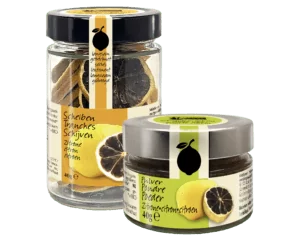Yotam Ottolenghi and dried lemon
Yotam Ottolenghi is an Israeli-British chef and author of arguably one of the best cookbooks in the world. He is known for his vegetarian culinary skills and has written recipes for The Guardian. He was awarded the Johannes van Dam Prize in 2017.
Yotam Ottolenghi and dried lemon
Dried lemons are small limes or lemons cooked in brine and dried until they are rock hard. Dried limes are a staple of Iranian cuisine. Ottolenghi uses them in two ways: whole or in powder form. He often adds whole dried limes to cooking liquids for rice, braising mixture for a stew or broth for a soup.
Ottolenghi recommends grinding the dried lemon with a spice mill before using it in soup. Naturally, you can also opt for the dried lemon powder from Amanprana. You can also use this delicate powder on rice or grain salads, or add it to a marinade as a substitute for a spice such as sumac, which it is surprisingly similar to. Consequently, dried lemon is easy to use and work into dishes, but despite their growing popularity, dried limes and lemons have not yet achieved the popularity of, for example, preserved lemons.
Yotam Ottolenghi’s cookbooks
When the Ottolenghi books first came out, dried Iranian limes & black lemons caused quite a stir. They were difficult to find. But they’re much more common nowadays. There are black dried limes and lemons as well as the lighter coloured beige dried limes. Dried limes lend a citrusy, smoky flavour to food, adding a savoury and zesty note to everyday dishes. Their flavour is distinct and slightly limy. Black limes have a somewhat smokier taste than the lighter ones. Black lemons from Amanprana, made according to their own in-house recipe, remain a beautiful yellow on the outside.
Iranian stew with black lemon
The vegetables are stewed in a broth of tomatoes, onions, herbs and dried lemons before being baked in the oven with berberis. This results in a delicious plate full of vegetables with a thick sauce and an incredible, distinct, citrusy flavour.
How do you make Loomi (black lime / lemon)? Which has the advantage of a less pungent flavour.
As the alternative names for loomi suggest, this herbal spice is made from limes. The process is a bit more complicated than just leaving your limes or lemons to harden in the fridge. According to The Kitchn, Loomi is made from Persian limes that are cooked in saltwater and then dried in the sun. The final product is a shrunken, dehydrated lime which varies in colour from brown to very dark brown. Amanprana’s black lemons remain yellow on the outside and black on the inside (their in-house recipe for a more citrusy flavour).
The saltwater bath helps the limes to dry out and prevents mould from forming. If you are adventurous, you can try making your own dried limes or lemons.
Loomi / black limes / dried limes / dried lemons are extremely hard and it takes quite a bit of effort to grind them up. To do this at home, you can wrap the dried limes / lemons in a towel and crush them with a hammer. Then you can grind the large pieces that are left in a spice mill or with a mortar and pestle. Fortunately Amanprana has dried black lemon powder.
Since it can be a challenge to grind, dried limes and lemons are often used whole in soups and stews. If you do this, first prick the lime open with a sharp knife or skewer to let the cooking liquid in and absorb the flavours. Remove the dried lime or lemon before serving.
Dried lemons lend a sweet aroma to marinades and stews.
Yotam Ottolenghi wrote in his book Plenty More that dried limes (and sometimes lemons) are often found in Iranian cuisine. He explains that the dried lemon or lime adds “a sharp and sweet aroma to marinades, stews and salads.” The flavour is also described as sour and lightly fermented.
How do you use Loomi?
Loomi is also used to season pilafs and other rice dishes. Dried lime is occasionally added to the herbal blend baharat.
You can buy dried lime and dried lemons in powder form, although, as with the majority of ground herbs, the flavours are not as intense as the whole dried fruit. Ottolenghi finds that you can replace sumak or grated lemon peel with dried lime or dried lemon, which have the advantage of being less pungent in flavour.
Dried lemon made according to their in-house recipe
Amanprana dries lemons according to their own in-house recipe. Black dried lemon lends character to stews, soups, marinades and tagines. Available as slices and in powder form
Black dried lemon
 Read more about Black dried lemon
Read more about Black dried lemon
